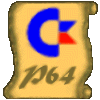CRT Format: Difference between revisions
mNo edit summary |
mNo edit summary |
||
| Line 1: | Line 1: | ||
The ''CRT Format'' is an artificial format for emulator usage | The ''CRT Format'' is an artificial cartridge format for emulator usage originally introduced by CCS64. It divides cartridges often into ''CHIP data'' chunks a C64 or other 8bit Commodore computer usually sees at defined memory areas. The ''CHIP data'' chunk size may vary. The ''CRT format'' sure is in no way the best format since it does not carry too much information about the cartridge itself, so whenever a new special ROM is found it can usually not easily be emulated by setting some parameters on the .crt file. Such cases will usually require special code just like the cartridge itself likely will require special hardware. | ||
The ''CRT format'' however holds basic information on the cartridge type, a name whenever it was given during conversion and information on handling the GAME/EXROM lines and how to treat the ''CHIP'' packets. It is pretty unknown wether the "special cases" for line and ROM/RAM handling on the CHIP packets has led to better working emulation somewhere. One may want to add that game cartridges are very well emulated in general and handled by the ''CRT format''. | The ''CRT format'' however holds basic information on the cartridge type, a name whenever it was given during conversion and information on handling the GAME/EXROM lines and how to treat the ''CHIP'' packets. It is pretty unknown wether the "special cases" for line and ROM/RAM handling on the CHIP packets has led to better working emulation somewhere. One may want to add that game cartridges are very well emulated in general and handled by the ''CRT format''. | ||
| Line 7: | Line 7: | ||
* [http://ist.uwaterloo.ca/~schepers/formats/CRT.TXT CRT.TXT at Peter Schepers' site] (with a [[CRT.txt|local copy here]].) | * [http://ist.uwaterloo.ca/~schepers/formats/CRT.TXT CRT.TXT at Peter Schepers' site] (with a [[CRT.txt|local copy here]].) | ||
* [http://www.computerbrains.com/crtformat.htm CRT format description at the CCS site] | * [http://www.computerbrains.com/crtformat.htm CRT format description at the CCS site] - inventor of the CRT format (outdated) | ||
* [http://www.infinite-loop.at/Power64/Documentation/Power64-ReadMe/AE-File_Formats.html See the Power64 Documentation at E.11] | * [http://www.infinite-loop.at/Power64/Documentation/Power64-ReadMe/AE-File_Formats.html See the Power64 Documentation at E.11] | ||
Revision as of 03:28, 8 January 2014
The CRT Format is an artificial cartridge format for emulator usage originally introduced by CCS64. It divides cartridges often into CHIP data chunks a C64 or other 8bit Commodore computer usually sees at defined memory areas. The CHIP data chunk size may vary. The CRT format sure is in no way the best format since it does not carry too much information about the cartridge itself, so whenever a new special ROM is found it can usually not easily be emulated by setting some parameters on the .crt file. Such cases will usually require special code just like the cartridge itself likely will require special hardware. The CRT format however holds basic information on the cartridge type, a name whenever it was given during conversion and information on handling the GAME/EXROM lines and how to treat the CHIP packets. It is pretty unknown wether the "special cases" for line and ROM/RAM handling on the CHIP packets has led to better working emulation somewhere. One may want to add that game cartridges are very well emulated in general and handled by the CRT format.
The best and most extensive description for the CRT format can be found in the VICE manual, chapter 15.11 The CRT cartridge image format - the VICE team also took over the task of assigning new CRT IDs.
Weblinks
- CRT.TXT at Peter Schepers' site (with a local copy here.)
- CRT format description at the CCS site - inventor of the CRT format (outdated)
- See the Power64 Documentation at E.11












